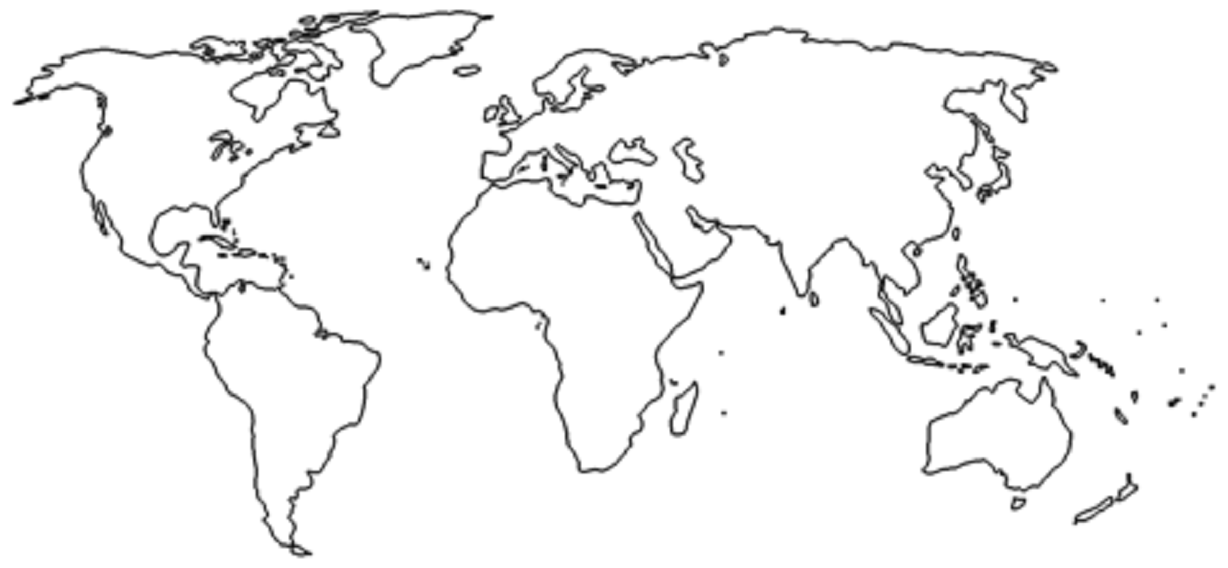Xiaohongshu was taken off the shelves for one month in the application store. Does it affect users and brands?
Xiaohongshu was taken off the shelves for one month in the application store. Does it affect users and brands?
Weibo social media crisis learning from Sesderma in China
With almost 400 million monthly active users by the end of 2017 on Weibo, without a doubt, every foreigner brand would consider Weibo as an important social media channel to build up awareness in China. We can imagine if one brand could appear on the top search topics, it may be because they have successfully created a big issue, but on the other hand, the popularity maybe also comes from unexpected negative feedbacks which a small issue could turn into a serious PR disaster in the blink.
We can always learn from other’s case and prepare tailored social media crisis management for our own brand in advance, and this time we learn from Sesderma’s experience.
Sesderma hit No.27 on the Weibo top search topics
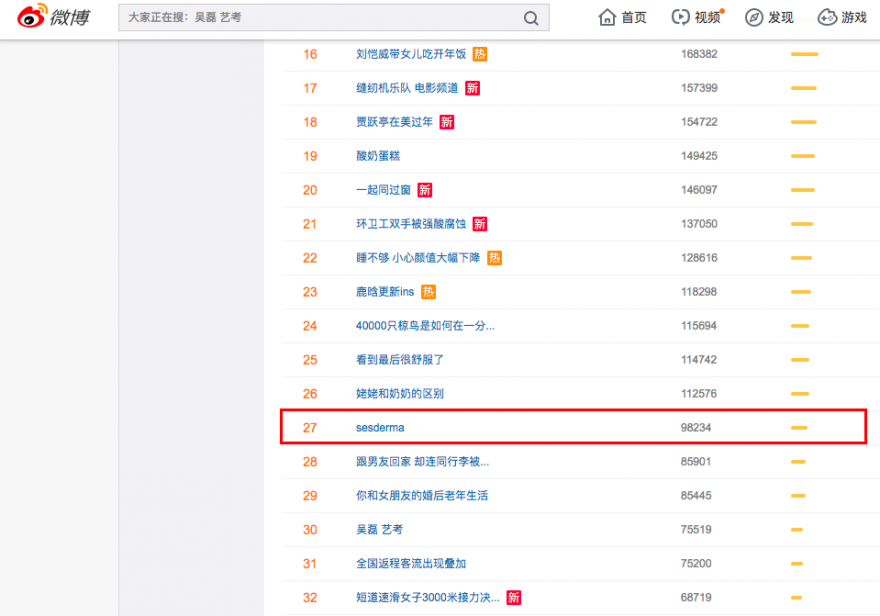
On the daily social media monitoring, we found that Sesderma, the well-known Spanish dermocosmetics brand was on the hot search list on Weibo, but they were dealing with the crisis out of a careless mistake in China. Their account has more than 7,000 fans, but the brand name search volume was 14 times more, we can assume the negative news brought in lots of people who aren’t familiar with the brand Sesderma before. What caused the PR crisis exactly? Let’s get back to where the issue started.
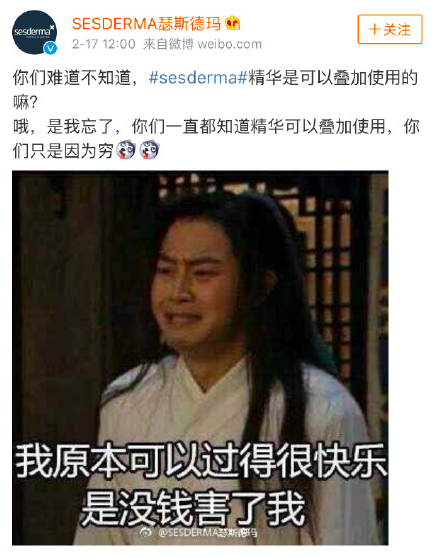
2/17 12 pm: Sesderma’s controversial post
Their intention was to educate the fans how to apply their product for a better result and created the post in a soft and self-deprecating way, but the critical part is they said “you” are poor and “you” don’t have money, so they misled the perspective and turned out to discriminate against the fans. Unfortunately, since then, the post started to accumulate passive comments in a quick-speed.
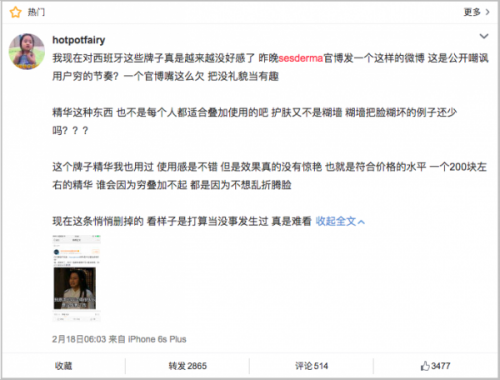
2/18 6 am: One user posted the negative feedback about Sesderma’s post (share:2,865 / comments:514 / likes:3,477)Not only the improper content, but the way Sesderma managed the issue. The user found Sesderma directly deleted the original post and without responding to fans’ anger. The post just went viral afterward, and it easily pushed Sesderma on the hot search list on Weibo.
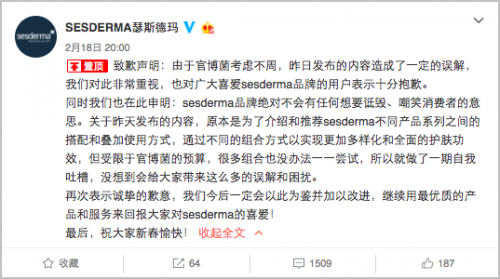
2/18 8 pm: Sesderma apologized sincerely to their fans
After waiting for more than one day, Sesderma had an official post to apology for their careless mistake. According to the comments, most of the fans could accept and left their support notes, but Sesderma continued to occupy the hot search topic position, until late afternoon on 2/20. Social media crisis comes easily, but it’s definitely hard to disappear.
3 takeaway to prepare crisis management on social media in China
1/Respond timely and as long as the mistake is confirmed, a sincere apology and open communication is needed
In many cases, actually, the crises are avoidable, if we can manage the potential crisis timely, and organize the crisis management team if necessary with members from involved departments, to create a open dialogue with fans within 24 horas.
2/Self-deprecating humor is easily taking over on social media, but extra care and attention for this kind of content is crucial
Sometimes self-deprecating humor is delicate, it’s better the content can be viewed and checked by different people to taste the respond. And keep the first person perspective clearly through whole content, as we can see in the Sesderma’s case, as long as you change the perspective, self-deprecating post could backfire quickly.
3/Chinese local team represents the foreign brand in China, so it’s important to work closely with headquarter to deliver the brand value
Even though many foreign brands have local subsidiary or agency to execute all the Chinese market marketing communications in China, but work integrally and have regular meeting is essential to keep both parts on the same track towards the ultimate success.
If you are interested in developing business in China through online marketing and e-commerce, 2 Open are glad to listen to you, please feel free to contact us by e-mail: INFO@2OPEN.BIZ, or just leave us a message below, we will get back to you as soon as possible.
5 Bugs To Avoid When Doing E-Commerce In China
Have you ever tried to build a new overseas brand and fail in your attempt? In any approach to China, foreign brands often make some common mistakes when trying to sell their products in China mainland. Although such misconceptions are not exclusive to online environment, we will focus on those that particularly affect your approach to e-commerce in China. China is already the world’s first e-commerce market.
Are you going to miss its enormous potential?
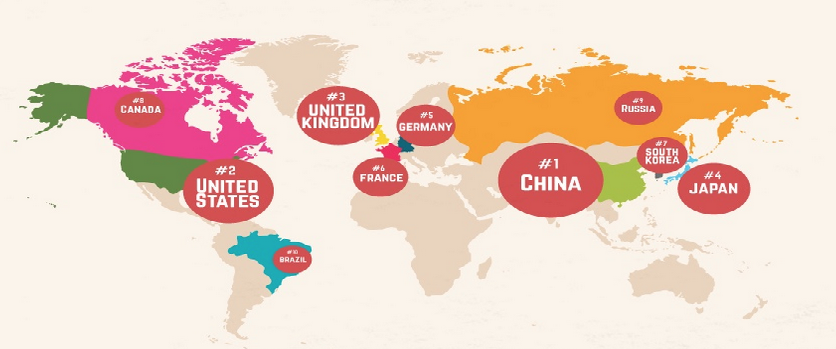
First bug: China is mobile, and you better record it
It is not the first time we tell you this, and for sure it won´t be the last. As we mention before in our article “How to Take Advantage of the Latest Ecommerce Revolution?”, Ecommerce has been a great revolution for both companies and customers.
Nowadays, Chinese prefer to use their mobile devices rather than their laptops and according to the new trend, companies have already starting to adapt themselves to portable devices. Moreover, those companies using U-commerce are focused on improving the customer experience through customizing and navigation created in cooperation with the User.
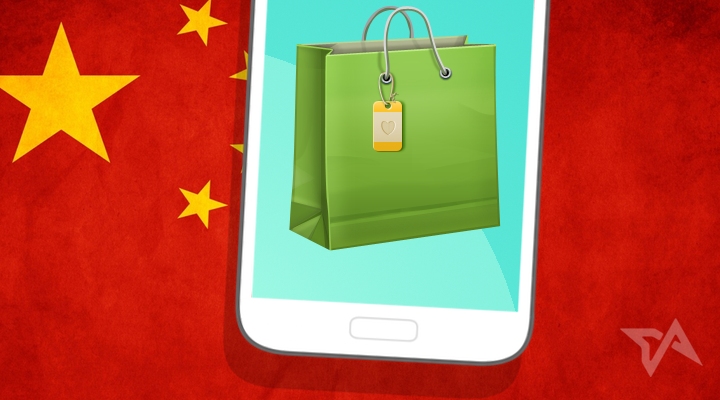
Second bug: E-commerce may be an asset in your country, but in China is irreplaceable
We cannot fail to mention Frank Lavin, CEO of Export Now, when he says,
“In China, Ecommerce is the cake.”
This may mean that you will need to adapt your business to the new environment. Do not expect it to be China who suits you, this does not work this way.
Remember that whoever hits first, hits twice. Embrace e-commerce as the enabler of your business it is, and take advantage of the immense benefits that electronic commerce can bring to your company to start selling around the World!
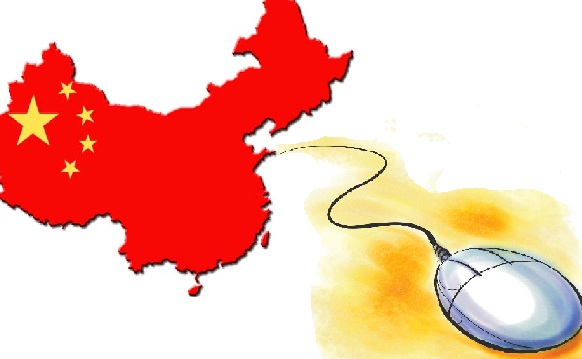
Third bug: Social Media is there to stay. Register your account and start moving!
Surely you’ve never heard the words Baidu, WeChat and Weibo… and let us tell you that you have a huge problem in China.
Not only around the 93% of the online searches in China are done in their own search engines –Have you ever heard Google does not work in China?– but also about a 68% of the customers take a look on the official Social Media account before buying.
Do not miss the opportunity to have a voice in that huge chicken coop is the network, start developing a tailored communication strategy for your brand and gain your piece of the cake!

Fourth bug: Domestic and lazy thinkers, or how the triumph from a day doesn’t make it daily
Do you think you will keep doing in China pretty much the same things you were doing before and as a result you will achieve success?
A basic rule you should never forget again is, no matter the experience and the many different markets in which you have entered before, is that new horizons always implies a new starting on your understanding of the target, so we definitely encourage you to start a market analysis.
Will your brand be competitive in China?
Do you offer something different regarding your competitors?
Is there a suitable market niche in the country ?
These and a thousand more questions require a prior discussion, keeping in mind that China should not be underestimated: the country enjoys some peculiarities you definitely must know before starting your landing.
We strongly recommend you seek assistance from professionals focused on the Chinese market, in order to enhance your chances of success in the country.

Fifth buf: Do not try to do everything by yourself, ask for advice
We are not tired of saying it, and will do so again: China is not a flat road. Do not try to embark on this mission unaccompanied, but pick very well with whom.
Look for complementary partners interested in joining forces, go to Government agencies dedicated to external actions and internationalization and definitely search for specialized agencies in the country to start outsourcing some tasks.

Already in search of a consulting expert in digital marketing and e-commerce? You have come to the right place.

New Online Advertising Rules in China
New online advertising regulation in China will impact all digital business with presence in China. Here we bring you an analysis overview to start adapting to the new trend in advertisement.
It would be after the death of a college student who took part in an experimental health treatment found in Baidu, when popular pressure would force the Government to begin an ads regulatory change.
The Internet Ad Interim Measures, a new regulation prompted by the State Administration for Industry and Commerce of China, went into effect in September 1st. Therefore, it arises from the Government’s claim by adopt new rules over online advertisement: email, paid searches, embedded links, images, and videos are already subject to the new law. Its aim is avoiding the spread of misleading advertisements on the Net, and correct the prevailing liberality so far.
The new online advertising regulations are expected to impact on Chinese Digital Marketing as a whole: social media, search engines, apps and electronic commerce in the country will have to move under the new guidelines.
A step closer to the uses and customs in Western advertisements
For the first time in China, the new measure features a specific definition of Internet advertising; often, foreigners suffer from a lack of legislative safety in China. Therefore, conceptualization is a step forward to define clearly not only the concept, but also its extension:
“Internet advertising is advertisements that directly or indirectly sell commercial goods or services through the websites, web pages, internet applications and other forms of Internet media including text, images, audio, video and etc.”
Moreover, the regulation comes to underline its main purpose:
“To protect the legitimate rights and interests of consumers, and promote the healthy development of the Internet advertising industry.”

In what fields are these changes applicable? What changes will take place after its implementation?
The regulation is particularly focused on a list of fields described below:
-Healthcare and medicine
-Food and beverage
The main measures to be starting to apply can be summarized as:
–First, the Law requires to place the word “advertisement” in a prominent position and clearly distinguishable at first sight.
–Second, every field subject of special regulation needs a previous review and an approval process by authorities.
–Third, online advertisements for prescription medicine is banned. A special measure in health products is also extended to medicines, pesticides or medical supplies.
–Fourth, tobacco online ads are also banned.
–Fifth, any paid search results, links or content must be clearly identified by the word “advertisement”.
–Sixth, users should not only have the choice to close an ad, but also this has to be easy to them.
–Seventh, paid links and contents must be clearly detailed at a glance.
–Eighth, any attached ad and/or promotional links to an email should have been allowed previously.
–Ninth, any misleading and/or false ad is considered illegal from now on.
Who is especially affected by the new regulation?
Under this measure, the biggest impact falls on the largest Internet companies in China. Baidu and Bing should apply new restrictions on ads; it should not be forgotten that, much of the incomes of Baidu, Weibo or Alibaba come advertising.

But also traditional Social Media must change. WeChat or Weibo offer paid content; as we mention before, pop-ups, ads or links should be first permitted, which will force companies to evolve the way advertising is offered to Chinese users. Seems marketers should start creating better ads, or contravening the prevailing legislation with all the penalties that that means.
There are plenty of creative ways to sell your services and products in China. In search of a Digital Marketing Agency?
Infographic: 10 Things You Need To Know To Build a Chinese Website
A picture is worth a thousand words
After the great success achieved by our two articles 10 Things You Need To Know To Build a Chinese Website (I) (II), in the team we have thought it would be a good idea to summarize and turn them into an infographic.
We hope you enjoy it as much as we enjoyed its elaboration 🙂
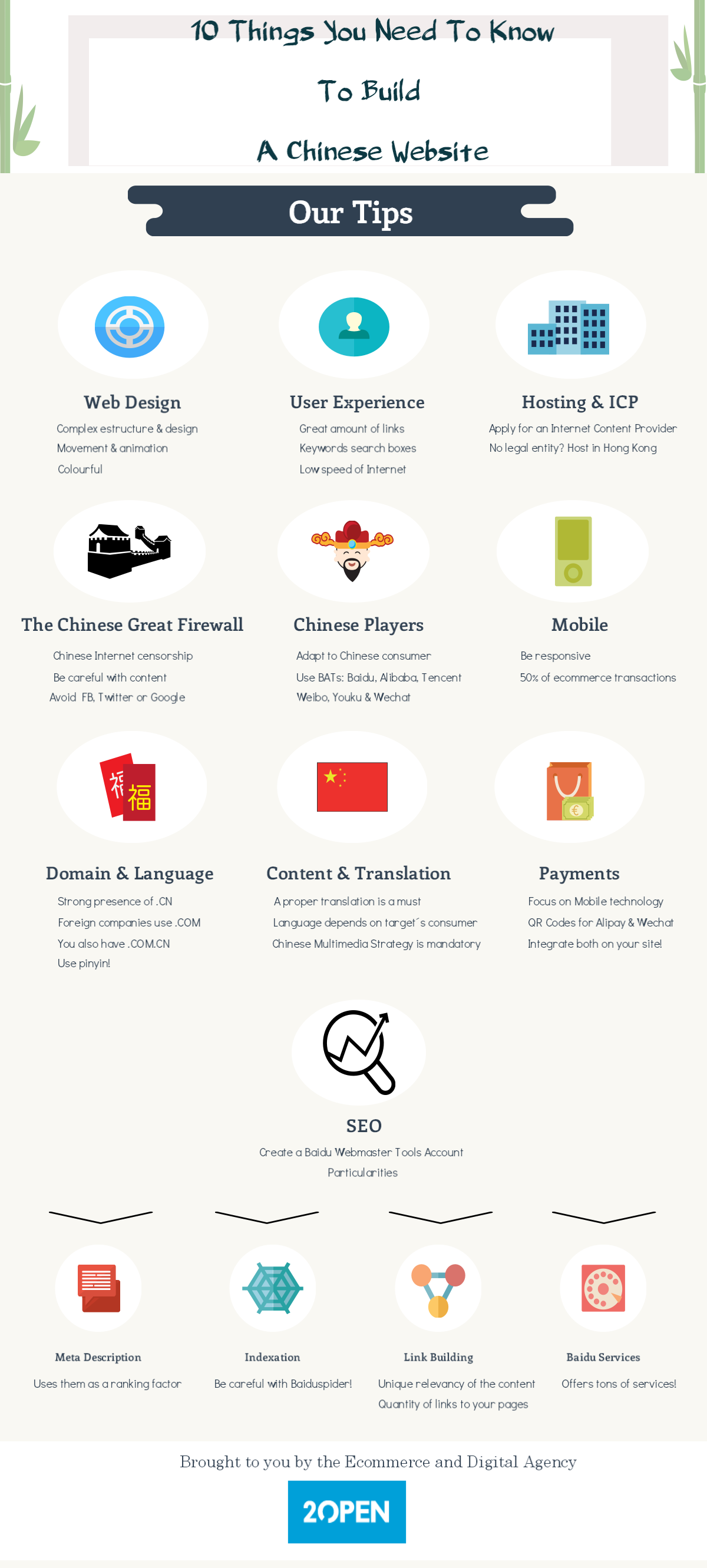
Are you looking for a digital marketing and ecommerce agency?
Visit us. Let´s have a talk!
Is Sina Weibo On The Way Out?
There are plenty of Social Media platforms in China: while a few achieve great success, many succumb to a highly competitive scenario.
Result of its dynamism, it is essential to keep attention on the changes that China faces in the digital world.
From 2 Open, we have prepared a brief introduction about Weibo´s current situation.
Our goal is to give you some tips to fully understand what is going on with one of the biggest Chinese Social Media.
Do not hesitate to contact us for a more thorough analysis!
Weibo is a Social Media platform to produce, share and find out Chinese-language content.
As a leading platform, provides an easy way to express in real time and interact with people and corporations.
Its importance is not only due to its capacity to be an official/unofficial news source, but also because it allows people to express themselves in a public way.
The doomsayers come into the picture
Currently, Alibaba is the biggest Chinese e-commerce company: it provides C2C, B2C and B2B sales services via web portals, plus electronic payment services, a shopping search engine and data-centric cloud computing services.
Three years ago, Alibaba bought 18% stock of Weibo. Since then, several media have speculated that Weibo or even Sina might be acquired by Alibaba in a short time.
Encouraged by the rise of Wechat, many marketers have predicted the fall of Weibo. Well, the latest Earnings report proves they were wrong.

Is Weibo on the way out? Let the Earnings speak the truth
According to official Earnings Report of 2016 Q2 from Sina Weibo, the Net profit of 25.9 million dollars (net revenues of $ 146.9 million) increased 516% compared to the same period last year.
Moreover, Weibo 2016 Q2 data shows the Total revenue of Weibo is 146.9 million, including 127.2 million revenue from Advertising business, value-added services $ 19.7 million for value-added services.

Let’s review the users’ data on Weibo now
Monthly Active Users –MAU- is 282 million, increase 33% compared to the same period of last year. In addition, Daily Active Users –DAU- is 126 million with 36% increase compared to same period of last year.
Is noteworthy that 89% of them are mobile users.
The progress is closely related to their own media advantage
Three years ago, relying on its social communication advantages, Weibo attracted $ 600 million of Alibaba, while became an effective channel for celebrity campaigns, events, marketing and other commercial activities.
After that, Weibo focused on the advertising model. At the end, it decided to put aside Alibaba and manage the business alone.
In 2016 Q1, advertising investment from small and medium enterprises increased 147%. The quantity of SME’s and self-service advertisers reached 830K with 25% increase compared to previous quarter.
In 2016 Q1, investment in small and medium advertising revenue grew 147%, the number of SMEs and self-service advertisers reached 830,000 and a 25% increase the previous quarter.
Why both SMEs and big brands value Weibo a lot?
Both leverage it as an important channel frequently, specially because:
- Increase of traffic and users with 282 million MAU
- Optimized Algorithm of Ad Platform
- Active Internet Celebrities
- Live-streaming
The outbreak of short videos
We should add that speaking of its development path, the outbreak of short videos is also a milestone of growth of Weibo.
According to the 2016 Q2 Earning report, the playback amount of short videos on Weibo has increased 200%.
Meanwhile, the Internet celebrity economy is rapidly booming. Based on short videos, live-streaming broadcast and e-commerce, Weibo occupies the core position of social media with its incredible social power.
Margin improvement for future
The operating leverage will keep being prominent in the future. Based on the non-GAAP, the operating Margin rate of Weibo was 23.6% in the second quarter.
It is expected that the Weibo´s operating Margin rate could reach 25.2% in the third quarter, 23.4% in 2016 financial year, and 28.7% in 2017 financial year.
After seven years, Weibo proves to the world its strength and influence.
Do you still think Weibo is on the way out?
Our Digital Marketing and Ecommerce Agency have the experience of a team dedicated to know in depth the Chinese Social Media.
If you are looking to push your sales in China, do not hesitate to contact us.
Moreover, if you are interested in receiving to your mail the latest trends of Chinese Social Media, please suscribe to our monthly Newsletter!
This article has been edited by Paula Vicuña, from 2 Open.
How to Acquire Chinese Tourists through Digital Marketing
It is almost August and tourists are everywhere. From 2 OPEN we are pleased to give you some basic steps to acquire Chinese Tourists through Digital Marketing.
Since 2013, the number of Chinese outbound travel population and tourism consumption both already ranked the world’s first.
In the next few years, Chinese outbound tourism consumption market will continue to maintain high growth speed: 174 million Chinese people will choose to travel abroad, and the amount of consumption will be around 264 billion US dollars in the year 2019 by estimation.
Chinese tourists has become the “cash cow” of global travel industry
This prosperity is due to the increase of urban population and disposable income, the rise of the middle class, RMB appreciation, the gradually liberal visa policy and the increase of international flight routes have given rise to the empowerment of as a yet undeveloped sector.
What kind of travel products do Chinese tourist usually choose when travelling?
When travelling, Chinese tourists mainly choose to travel with tour guide, both group package and/or flight + hotel. Even if travelling without guidance is still scarcely used, it is a fast leading trend and a great opportunity of future.
Which Channels do Chinese tourism use to purchase travel products?
Even if traditional travel agencies are still the most popular, every day more Chinese opt to book though Online travel agencies, such as Ctrip and Qunar. It is highly likely that its importance grow each year.
How Chinese travelers spread their feeling about their country-destination?
The consumption of Social Networks in China is massive. Either through posts or instant messaging, the power of “Word of Mouth” is overwhelming.
Wechat and Weibo play a very important role in choosing destinations for Chinese people.
From 2 Open, we suggest you paying attention to online platforms in any plan to approach the Chinese market.
Which channels do Chinese people use to search touristic-information?
Either through an Agency´s Website or through Social Media, Chinese travelers love using new technologies to discover places, compare tariffs and share their experiences abroad.
Once again, the power of the main Social Media Platforms in China –Wechat and Weibo– is increasing each year.
What do Chinese travelers suggest for information channel?
The most expected information search channel for Chinese travelers is to set up Chinese official website, followed by WeChat and Weibo Chinese accounts set-up.
So, What can you do to attract more potential Chinese tourist to your destination?

From 2 OPEN we suggest you some ideas before starting your approach to China:
- Build a Website:
To set up a Chinese Website, this must be hosted in China (-cn domain). It would be necessary to make it consistent with Chinese search engine´s standards and be entirely written in Mandarin.
From 2 OPEN we strongly suggest you to take advantage of new technologies –Big Data- to improve the user experience and target the right audience.
- Search and Display Marketing:
Baidu, the biggest Chinese search engine, is essential on any approach to Chinese digital market. Your site should be well-ranged on Baidu´s search engine to let Chinese tourist find you.
In 2 OPEN we have the expertise to deal with SEO or SEM campaigns, in order to help you to gain visibility and target potential customers.
- Social Media:
Social networks are the most used channels in China. Try to attract users to your official accounts –WeChat and Weibo– by posting travel news and proposals to people. Start your Social Media plan with our help!
- Key Opinion Leader:
To build a proper networking with Key Opinion Leaders on Social Networks can make the difference in China, and they are a very effective way to promote products and services.
- Cooperate with a third-party agency:
Online Travel Agencies -like Ctrip– provide a package of services include tickets, hotel, tourism products and car rental etc. Cooperate with them will bring you huge traffic and a great chance to sell. In addition, Online Travel Agencies let customers interact each other about trips, top destinations and advices.
From 2 Open, we encourage you to take an advantage of their social marketing impact by improving your content marketing.
- O2O:
In last year, China tourism O2O industry achieved great improvement. The relationship between resources and platforms become closer under the impetus of capital. Wheather through Online platform + offline resource or Online channel + offline channel, both can make the difference.
- Offline Event and Public Relations:
Traditional offline advertisement promotion can be useful in China, but very expensive. Combine Online and Offline Marketing can be the top-solution for your company.
We hope this information has been valuable and helpful to you, and we encourage you to start your approach to the huge Chinese tourism market. With our help, your company could take the great advantage online marketing offers!
Have a look to our services!
This article was edited by Paula Vicuña, from 2 OPEN.
10 things you need to know to Build a Chinese Website (Part 1)
When planning to enter the Chinese market, one of the main points in every marketing plan should be the creation of a website that focuses on the Chinese consumer.
Naturally, there are some questions that come to mind…
- What are the differences between a western and an eastern website?
- What are the aspects that I have to keep in mind in order to trying to attract Chinese consumers?
- Would it be a good idea to just duplicate and translate my current content?
All of the above can be summarised in one question; what do I need to do in order to create a great website that will have the potential to reach the 675 million China internet users?
In this series of posts, we will try to give you some tips that will help you create a website for the Chinese market that will appeal to Chinese consumers and also match the style, tech and literary attributes of eastern consumers.
1 – Chinese Web Design – What the …???
When we look at a Chinese website, the first feeling we get is confusion… Language, structure, content … We can´t find anything similar to Western websites based (lately) on cleanliness and simplicity. Our China web design must be adapted not to our tastes, it must match Chinese consumer design taste.
If you have not navigated through Chinese websites maybe you don´t completrly understand what I mean. You´ll see easily the difference with these two examples. Taobao and Ebay, two B2C marketplaces (or C2C) from east and west.
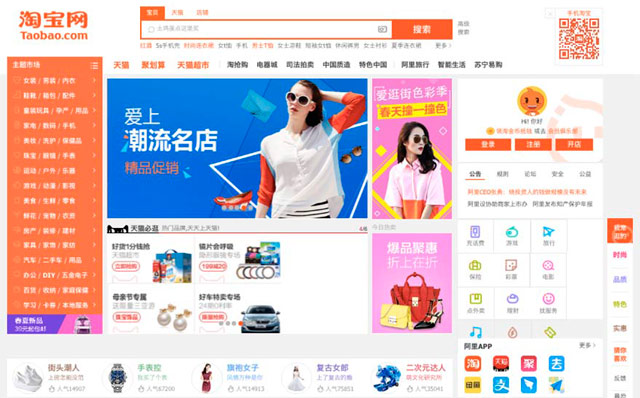
China Web Design Example – Taobao Home Page
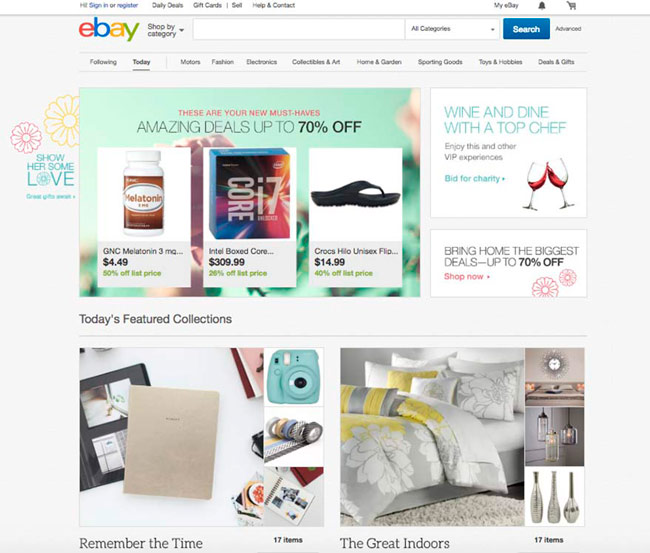
Western Web Design Example – Ebay Home Page
Can you appreciate the difference in style, design, structure? I bet you do…
We can see a lot of information on Chinese site in contrast to the cleanliness and simplicity of the western site.
Our experience creating websites for the Chinese market has shown us some key points to understand and get advantage:
- Chinese websites use many more elements and are much more colorful than Western.
- Chinese language is different. It seems obvious… but there are things we have to consider about Chinese language such as:
- There is not a capital letter in Chinese
- There are no spaces between characters
- Chinese characters are far more dense than our letters
- Chinese sites use a lot of animation, flashing texts and banners. This is clearly the opposite to our western websites where movement is disappearing. The reason can be it’s much harder to grab attention using fonts in Chinese than it is with western languages.
2 – User experience… Do they have any good one?
We have just seen as websites in China seem much more complex than we are used to. We might think that the user experience will be a nightmare, but Chinese user is so accustomed to information under this structure as we are to the western structure.
Chinese user is concerned about usability and user experience, but is used to webpages so busy usually does not care how the site looks. However the trend is towards simplicity and clarity on web pages. In a more European style.
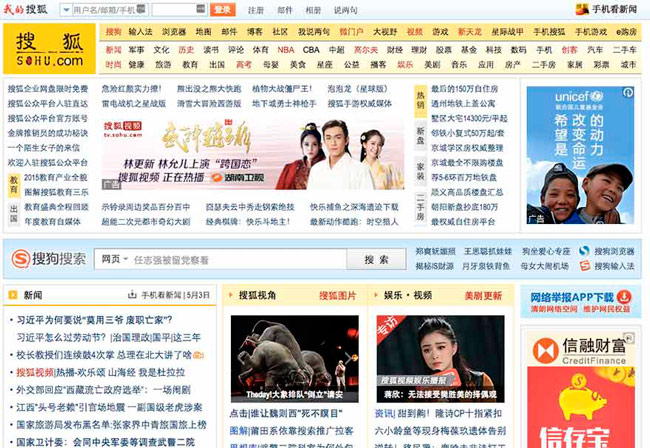
Where is (link) Wally?
Some of the highlights on Chinese websites regarding to navigation are:
- Chinese websites have a big number of links, however Chinese users do not like this system. This can be given by the low load speed internet in China.
- All this links use to open in other new windows. Why? Again it’s mainly an issue of speed. Internet access in China is generally slow, users have gotten used to opening new links while waiting for a page to load.
- Keyword search box as a navigate tool. Link system is not comfortable for users because they can be lost due to the big amount of links. For this reason, on Chinese websites keyword searches have to be really efficient, and the search bar must be top accessible.
3 – Hosting & ICP. DIstance matterS
The one who said that, in internet there is no distance, did not know about China. If you are not (legal and/or physical) in Mainland China, easy staff like finding the right hosting can became a little bit more complicated.
Let´s start from the beginning, one of the most common questions when we are going to create a China site is should we host our website within or outside China? Is there is a big difference? The answer is very clear, as far as possible we should try host the web in Chinese Mainland, and we will try to explain why.
China network structure is not the best, which makes the websites loading speed not the most appropriate. By hosting our web outside China this problem becomes much more serious.
Okay, so we are clear, we should host our website in China, now what? We must apply for a number of ICP (Internet Content Provider) to the Ministry of Industry and Information Technology of China. This is the ICP license that will allow our site to stay in Mainland China. Only companies with a physical presence in China can apply for this license (which usually see in the footer of the sites, as in our case).
For companies that do not have a legal entity in China, we do recommend looking for hosting solutions in Hong Kong, which can limit the problem of loading speed and make our site more accessible for the Chinese user.
Now that we talk about speed, even though the main problem affecting the same be the hosting (inside or outside) there are also other factors that can make our web go slower (and we have seen that it is a key point in China) as can be:
• Website images are not size optimized
• Poorly code in our website
• Low hosting quality (even inside Mainland China)
• Our site is using services blocked in China (Google Fonts, Google Maps, Twitter, Facebook, etc…) which prevents the page from loading
4 – Did you say… services blocked? … the Chinese Great Firewall
China not only has a huge physical walls to defend themselves (in the past). China also has a large digital wall, the Great Firewall. Originally known “Golden Shield Project” but ironically nicknamed Great Firewall, it is a censorship and surveillance project initiated by the Chinese Ministry of Public Security in 2003.
This project acts as a digital censor and block all websites that do not meet the content requirements that marks the Chinese government.
Here you can see some more information about how the censorship works.
Among other things, Chinese Internet censorship censored webpages that have content that include; news sources cover topics considered that are defamatory against China: such as police brutality, Tiananmen Square protests of 1989, freedom of speech, Taiwan Government, Dalai Lama or the Tibet Independence Movement International …
These sites are banned or are indexed to a lesser degree, if at all, by some Chinese search engines and have significant impact on search results.
As a result of this control in China they are blocked pages as usual for us as Google, Twitter or Facebook (it does no matter how much Mark go jogging in Tiananmen). Although great firewall control is easy to jump (using a VPN, for example) the difficulty of accessing these pages has made their use and popularity is low.
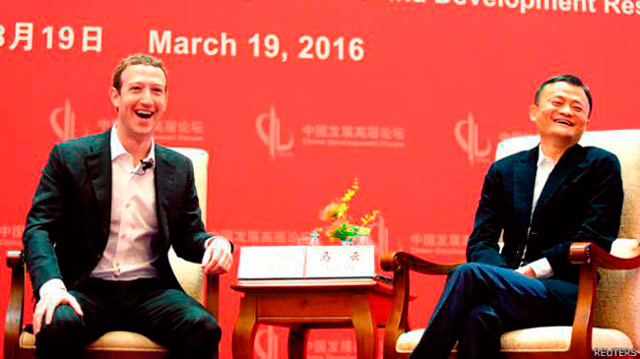
Stop laughing Mark. It´s not gonna happen
This means we need to be very careful with our website content, try to be sure to avoid Great Firewall content restrictions and not to use third party banned platforms like Google (Google Maps, Google Fonts), Facebook or Twitter.
5 – New Players & New Rules
So, no Facebook or twitter, how am I going to promote my website? China has a digital ecosystem different of everything we are use to. Surely you’re wondering how you survive without some of the usual promotional tools. Natural positioning in Google, PPC Adwords campaigns, promotion of content on social networks like Facebook or Twitter …
In China you will find new players who have occupied these gaps and in some cases, created new niches. These new players have taken advantage of the absence of foreign competition (Facebook, Google …), its adaptation to Chinese culture and peculiarity and in some cases even a strong government support.
These actors we found some “copycat“, certified copies of known systems, such as:
- Baidu, the Chinese search engine par excellence (suspiciously similar to Google)
- Weibo, the microblogging service (suspiiiiciouuusssslyyy similar to Twitter)
- Youku, video service (guess who it is similar?)
We also have WeChat, the jewel of the crown and the mobile app (almost an OS) that includes messaging, payments, calls, moments … and which we discussed in detail in another post.
For our website to be inside China digital life it must be adapted to the rules of these actors, common in the dailylife of the Chinese consumer.
So, who are the big guys that you need to be friend of?
As soldiers in a war, most of these tools fall into three large “armies”. These three groups are known as the BAT and are in constant battle to dominate the Chinese digital ecosystem.
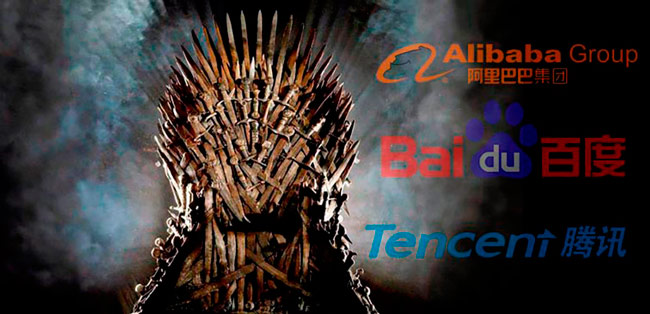
Who is going to win this war?
In short, Baidu holds commanding market share over search. Alibaba holds to the same power over e-commerce. Tencent is the dominant player in social media. But they are constantly trying to invade their territory, in a very interesting war for any fan marketing.
One of the commonalities of the BAT is a full support of the government, together with its dominant position in the market, makes this status quo is difficult to change.
What does it means for our website? We need to adapt our communication to this new players, generating our social media activity through Wechat, optimizing our SEO for Baidu or 360, uploading our videos in Youku, adding sharing actions in our content with Chinese social platforms… anything we use to do in our occidental site does not help us here and can be even negative for our goals. As we have seen, if we keep on using tools like Facebook (post sharing options for example) we can be blocked by the Great Firewall.
Do you want to know more? Sure? CHECK THE SECOND PART OF THIS POST HERE
References:
http://www.china-briefing.com/news/2015/05/22/best-practices-launching-china-website.html
https://econsultancy.com/blog/67466-why-do-chinese-websites-look-so-busy/
http://www.latmultilingual.com/build-localized-chinese-website/
Sources:
http://www.freepik.com/free-vector/screen-with-a-website-and-icons_847180.htm
http://www.freepik.es/vector-gratis/trabajador-llorando_834598.htm
L’Oreal Digital Marketing Campaign in China
In the first half of 2015, L’Oreal’s financial statement reported revenues of 12.82 billion euros worldwide. In comparison with 2014, there was an increase of 14.7%, which is the fastest growth that the company has had in the past 20 years. Its digital marketing campaign was not the exception, with an outstanding 40% increase in online sales, exceeding 1 billion euros; it represented 5% of the company’s total turnover strengthening its position in the online market.
Nowadays, in the cosmetic & beauty industry, 70% of customers search products online before they actually buy them, which means that social media must play a big role in this. Why? You might be wondering, well, the importance of knowing consumer’s needs and preferences enables companies to come up with tailored ads and maximize their marketing budget. Many industries have transitioned from the classic marketing model into its modern version to further understand consumers and optimize results.
It seems that the upcoming era is digital, the society now is constantly connected with their mobile phones, and people are interacting on social media all the time. Most Chinese people love to share moments of their daily life via Weibo or Wechat, these social mobile applications gather a lot of Chinese young people who are potential online buyers, this is one of the main reasons why this new consumption model results so profitable.
Taking all of this into account, L’Oreal, the global beauty brand, keeps track of trends and maintains strong competence in the Chinese online market. The business credo for the marketing industry “where are the consumers, where are we” is practiced well by L’Oreal. In fact, in the digital marketing revolution, L’Oreal is not only expanding its e-commerce channels, they also apply a complete strategy to digital marketing.
All the product and services have to be digitalized
For instance, on the CES conference in Las Vegas, L’Oreal released a patch for sun-induced skin damage – My UV Patch, helps users track real-time ultraviolet exposure damage on the skin with the help of an App. In addition, L’Oreal has also launched a mobile App called Makeup Genius. The App can help users find their own appropriate makeup. Most Chinese people are shy and they do not dare to try exaggerated makeup, with this App users can try hundreds of makeup options and share on various social platforms. In the future, L’Oreal will try to launch more service-oriented App.
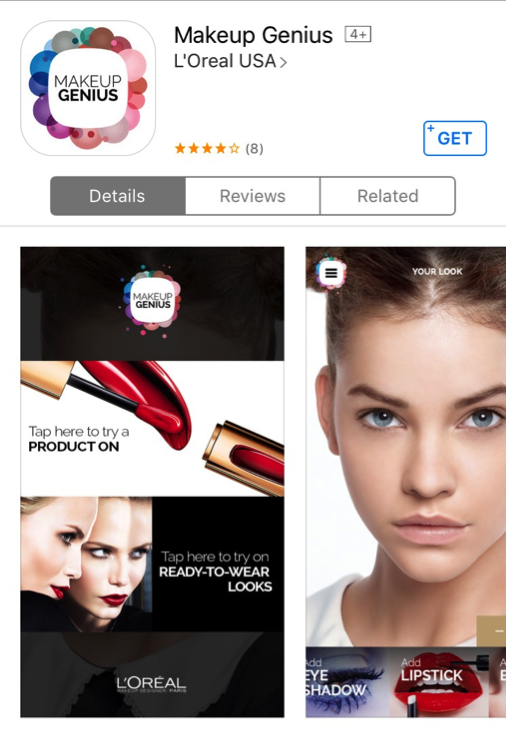
-L’Oreal APP for IOS
Digital involvement into every step of decision-making
In the buying decision process, customers experience 4 steps: identifying, considering, purchasing, and sharing. L’Oreal gets involved in every step of the process. For brand awareness, they launched a video advertisement on the entire media platform of Weibo and Wechat. For the decision-making stage they issued a series of makeup tutorial videos on Youku and finally let the users use social media to share their purchasing experience. With this, the entire consumer decision-making process is digitized.
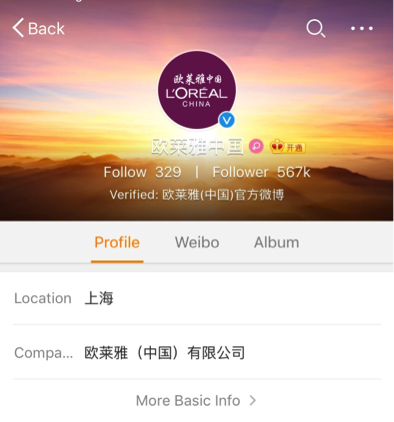
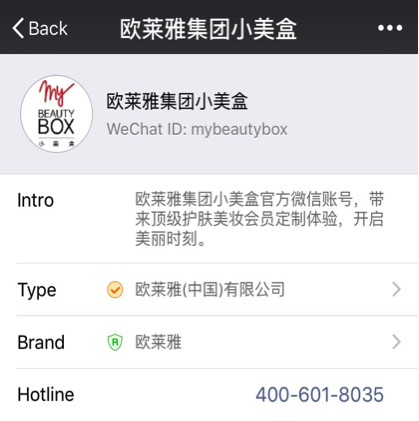
-L’Oreal official account on Weibo and Wechat
Take this case for example, in the 2015 Cannes Film Festival; L’Oreal launched a video advertisement on Wechat, where L’Oreal’s stars would post their pictures and voice message saying “I am in Cannes, will you come? ” and a link to L’Oreal’s e-commerce page. Through this event L’Oreal attracted a lot of fans and potential customers, and the brand’s social influence was digitalized.

-L’Oreal Cannes Event on Wechat
All brands on digital platforms
Based on the first two points, L’Oreal Group including Lancome, Maybelline, L’Oreal Paris and other brands, try to position themselves, as much as possible, on various digital platforms, that is, “where are the consumers, where are we”. Since, nowadays, almost all of the customers are online, L’Oreal has to be searched and discussed as much as possible by customers in order to gain more popularity in the digital world.
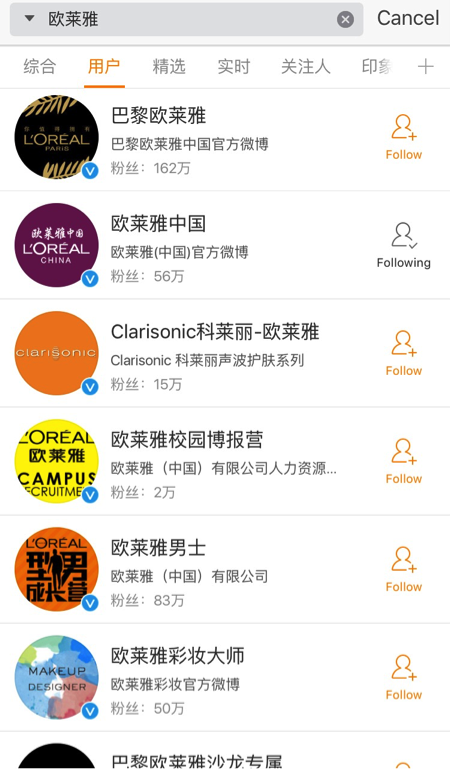
-L’Oreal brands on Weibo
When analyzing L’Oreal’s digital marketing strategy, it is worth noticing that this giant enterprise takes digital marketing as a key element of responding to the rising demand among beauty consumers. The O2O (online-to-offline) model gradually drives the enterprise transforming it into a new business model. Digital marketing could not only develop a new market but also help to create a new CRM (Customer Relationship Management) system for other companies. We believe in the future and Chinese digital marketing will become more and more important in the following years.
Have you learned Chinese yet?
If you have any questions or require any information about our services, please do not hesitate in contacting us, our group of specialists will happily assist you.
This article was edited by Andres Arroyo Olson from 2Open.









